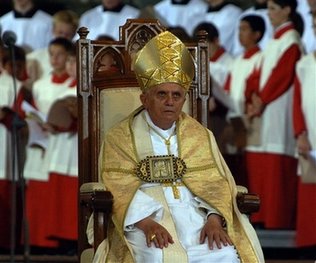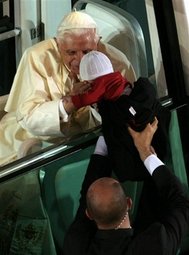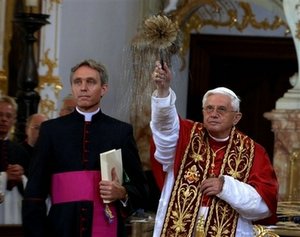More Messages and Photos
JMJ+D
 Here are some messages of the Holy Father during his visit:
Here are some messages of the Holy Father during his visit:
To scientists at the University of Regensburg, where he was a professor and vice rector from 1969 to 1971.
Faith, Reason and the University Memories and Reflections
Distinguished Ladies and Gentlemen,
It is a moving experience for me to stand and give a lecture at this university podium once again. I think back to those years when, after a pleasant period at the Freisinger Hochschule, I began teaching at the University of Bonn. This was in 1959, in the days of the old university made up of ordinary professors. The various chairs had neither assistants nor secretaries, but in recompense there was much direct contact with students and in particular among the professors themselves. We would meet before and after lessons in the rooms of the teaching staff. There was a lively exchange with historians, philosophers, philologists and, naturally, between the two theological faculties.
 On Islam
On Islam
Speaking to an audience of scientists and scholars, at the university where he himself once taught theology, the Holy Father argued that Christianity welcomes intellectual inquiry and always reveres the truth. The academic world, he said, should not be bound by a fear of addressing in turn that question raised by faith.
The Pope opened his lecture by quoting a scholarly work of the Byzantine Emperor Manuel II Paleologus, writing late in the 14th century, about the difference between the Christian and Islamic understanding of God. Tracing the emperor's argument on the use of force and the concept of "holy war," the Pope pointedly quoted from the Qu'ran (surah 2, 256): "There is no compulsion in religion."
Pope Benedict then quoted the emperor's challenge to his scholarly interlocutor:
Show me just what Mohammed brought that was new, and there you will find things only evil and inhuman, such as his command to spread by the sword the faith he preached.
From the Christian perspective, the Pontiff continued, any attempt to use religious faith as justification for violent attacks is impossible. "Violence is is incompatible with the nature of God and the nature of the soul," he said.
 On Sacred Music
On Sacred Music
At a September 13 service dedicating a new organ for the Alte Kapelle (Old Chapel) in Regensburg, Pope Benedict XVI used the image of musical harmony to warn against "false notes" of dissidence within the Church.
The Holy Father, a gifted amateur pianist with a great love for classical music, obviously enjoyed the event, which included a performance of a Bach toccata and fugue on the new organ. He was accompanied-- as he has been on most public appearances in Bavaria-- by his brother, Msgr. Georg Ratzinger, the retired director of the Regensburg cathedral choir.
The Pope noted Regensburg's worldwide reputation as "a center for the reform of sacred music." He stressed the importance of that work, citing the teachings of Vatican II, saying that "music and song are more than an embellishment of worship; they are themselves part of the liturgical action."
The organ, the Pope continued, is known as "the king of musical instruments," because of the variety of sounds it creates, giving "resonance to the fullness of human sentiments."
"In the organ, the many pipes and voices must form a unity," the Pontiff said. If some pipes are blocked or damaged, the sound becomes distorted; the same is true if weather conditions affect the instrument.
"Now this is an image of our community," he said. "Just as in an organ an expert hand must constantly bring disharmony back to consonance, so we in the Church, in the variety of our gifts and charisms, always need to find anew, through our communion in faith, harmony in the praise of God and in fraternal love."
 More Laborers for the harvest
More Laborers for the harvest

"Under the watchful gaze of Saint Anne, in whose home the greatest vocation in the history of salvation developed," that of the Virgin Mary, the Holy Father invited those present to reflect upon "our vocation to serve Jesus Christ."
 "God's harvest is indeed great, and it needs laborers," said Pope Benedict, "in the so-called Third World - in Latin America, in Africa and in Asia - people are waiting for heralds to bring them the Gospel of peace, the good news of God Who became man. But also in the so-called West, here among us in Germany, and in the vast lands of Russia it is true that a great harvest could be reaped. But there is a lack of people willing to become laborers for God's harvest."
"God's harvest is indeed great, and it needs laborers," said Pope Benedict, "in the so-called Third World - in Latin America, in Africa and in Asia - people are waiting for heralds to bring them the Gospel of peace, the good news of God Who became man. But also in the so-called West, here among us in Germany, and in the vast lands of Russia it is true that a great harvest could be reaped. But there is a lack of people willing to become laborers for God's harvest."
 "Lord, ... look upon our world and send us laborers!" cried the Pope. "With this petition we knock on God's door; but with the same petition the Lord is also knocking on the doors of our own heart. Lord do you want me? Is it not perhaps too big for me? Am I too small for this? 'Do not be afraid,' the Angel said to Mary. 'Do not fear: I have called you by name,' God says through the Prophet Isaiah."
"Lord, ... look upon our world and send us laborers!" cried the Pope. "With this petition we knock on God's door; but with the same petition the Lord is also knocking on the doors of our own heart. Lord do you want me? Is it not perhaps too big for me? Am I too small for this? 'Do not be afraid,' the Angel said to Mary. 'Do not fear: I have called you by name,' God says through the Prophet Isaiah."
Entire messages from here.
 Here are some messages of the Holy Father during his visit:
Here are some messages of the Holy Father during his visit:To scientists at the University of Regensburg, where he was a professor and vice rector from 1969 to 1971.
Faith, Reason and the University Memories and Reflections
Distinguished Ladies and Gentlemen,
It is a moving experience for me to stand and give a lecture at this university podium once again. I think back to those years when, after a pleasant period at the Freisinger Hochschule, I began teaching at the University of Bonn. This was in 1959, in the days of the old university made up of ordinary professors. The various chairs had neither assistants nor secretaries, but in recompense there was much direct contact with students and in particular among the professors themselves. We would meet before and after lessons in the rooms of the teaching staff. There was a lively exchange with historians, philosophers, philologists and, naturally, between the two theological faculties.
 On Islam
On IslamSpeaking to an audience of scientists and scholars, at the university where he himself once taught theology, the Holy Father argued that Christianity welcomes intellectual inquiry and always reveres the truth. The academic world, he said, should not be bound by a fear of addressing in turn that question raised by faith.
The Pope opened his lecture by quoting a scholarly work of the Byzantine Emperor Manuel II Paleologus, writing late in the 14th century, about the difference between the Christian and Islamic understanding of God. Tracing the emperor's argument on the use of force and the concept of "holy war," the Pope pointedly quoted from the Qu'ran (surah 2, 256): "There is no compulsion in religion."
Pope Benedict then quoted the emperor's challenge to his scholarly interlocutor:
Show me just what Mohammed brought that was new, and there you will find things only evil and inhuman, such as his command to spread by the sword the faith he preached.
From the Christian perspective, the Pontiff continued, any attempt to use religious faith as justification for violent attacks is impossible. "Violence is is incompatible with the nature of God and the nature of the soul," he said.
 On Sacred Music
On Sacred MusicAt a September 13 service dedicating a new organ for the Alte Kapelle (Old Chapel) in Regensburg, Pope Benedict XVI used the image of musical harmony to warn against "false notes" of dissidence within the Church.
The Holy Father, a gifted amateur pianist with a great love for classical music, obviously enjoyed the event, which included a performance of a Bach toccata and fugue on the new organ. He was accompanied-- as he has been on most public appearances in Bavaria-- by his brother, Msgr. Georg Ratzinger, the retired director of the Regensburg cathedral choir.
The Pope noted Regensburg's worldwide reputation as "a center for the reform of sacred music." He stressed the importance of that work, citing the teachings of Vatican II, saying that "music and song are more than an embellishment of worship; they are themselves part of the liturgical action."
The organ, the Pope continued, is known as "the king of musical instruments," because of the variety of sounds it creates, giving "resonance to the fullness of human sentiments."
"In the organ, the many pipes and voices must form a unity," the Pontiff said. If some pipes are blocked or damaged, the sound becomes distorted; the same is true if weather conditions affect the instrument.
"Now this is an image of our community," he said. "Just as in an organ an expert hand must constantly bring disharmony back to consonance, so we in the Church, in the variety of our gifts and charisms, always need to find anew, through our communion in faith, harmony in the praise of God and in fraternal love."
 More Laborers for the harvest
More Laborers for the harvest
"Under the watchful gaze of Saint Anne, in whose home the greatest vocation in the history of salvation developed," that of the Virgin Mary, the Holy Father invited those present to reflect upon "our vocation to serve Jesus Christ."
 "God's harvest is indeed great, and it needs laborers," said Pope Benedict, "in the so-called Third World - in Latin America, in Africa and in Asia - people are waiting for heralds to bring them the Gospel of peace, the good news of God Who became man. But also in the so-called West, here among us in Germany, and in the vast lands of Russia it is true that a great harvest could be reaped. But there is a lack of people willing to become laborers for God's harvest."
"God's harvest is indeed great, and it needs laborers," said Pope Benedict, "in the so-called Third World - in Latin America, in Africa and in Asia - people are waiting for heralds to bring them the Gospel of peace, the good news of God Who became man. But also in the so-called West, here among us in Germany, and in the vast lands of Russia it is true that a great harvest could be reaped. But there is a lack of people willing to become laborers for God's harvest." "Lord, ... look upon our world and send us laborers!" cried the Pope. "With this petition we knock on God's door; but with the same petition the Lord is also knocking on the doors of our own heart. Lord do you want me? Is it not perhaps too big for me? Am I too small for this? 'Do not be afraid,' the Angel said to Mary. 'Do not fear: I have called you by name,' God says through the Prophet Isaiah."
"Lord, ... look upon our world and send us laborers!" cried the Pope. "With this petition we knock on God's door; but with the same petition the Lord is also knocking on the doors of our own heart. Lord do you want me? Is it not perhaps too big for me? Am I too small for this? 'Do not be afraid,' the Angel said to Mary. 'Do not fear: I have called you by name,' God says through the Prophet Isaiah."Entire messages from here.


0 Comments:
Post a Comment
<< Home